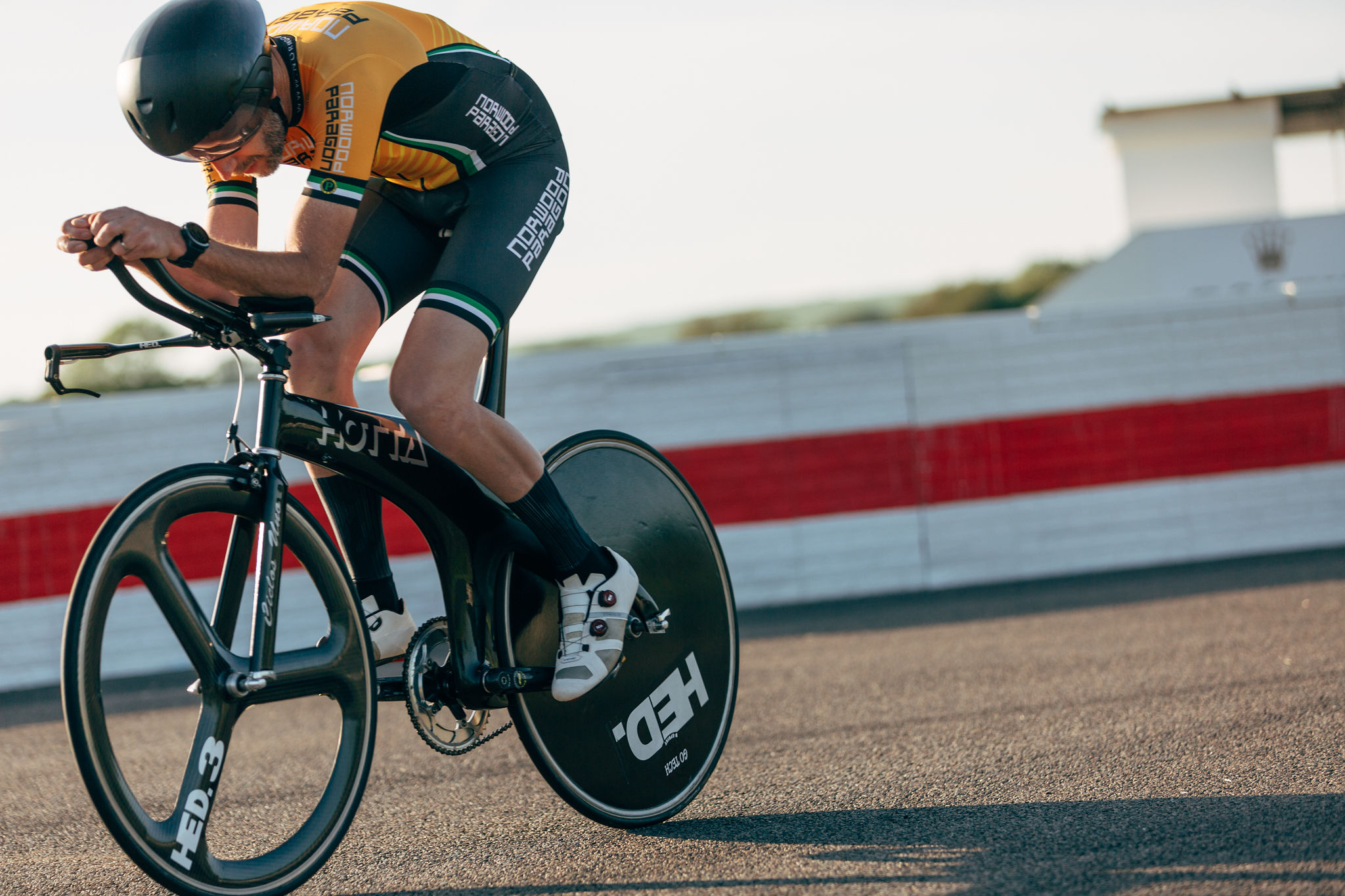Specialized Tarmac SL7 Expert review
The entry-level Tarmac SL7 is still a premium-priced bike – can it deliver £5K's worth of performance despite cost-saving components?
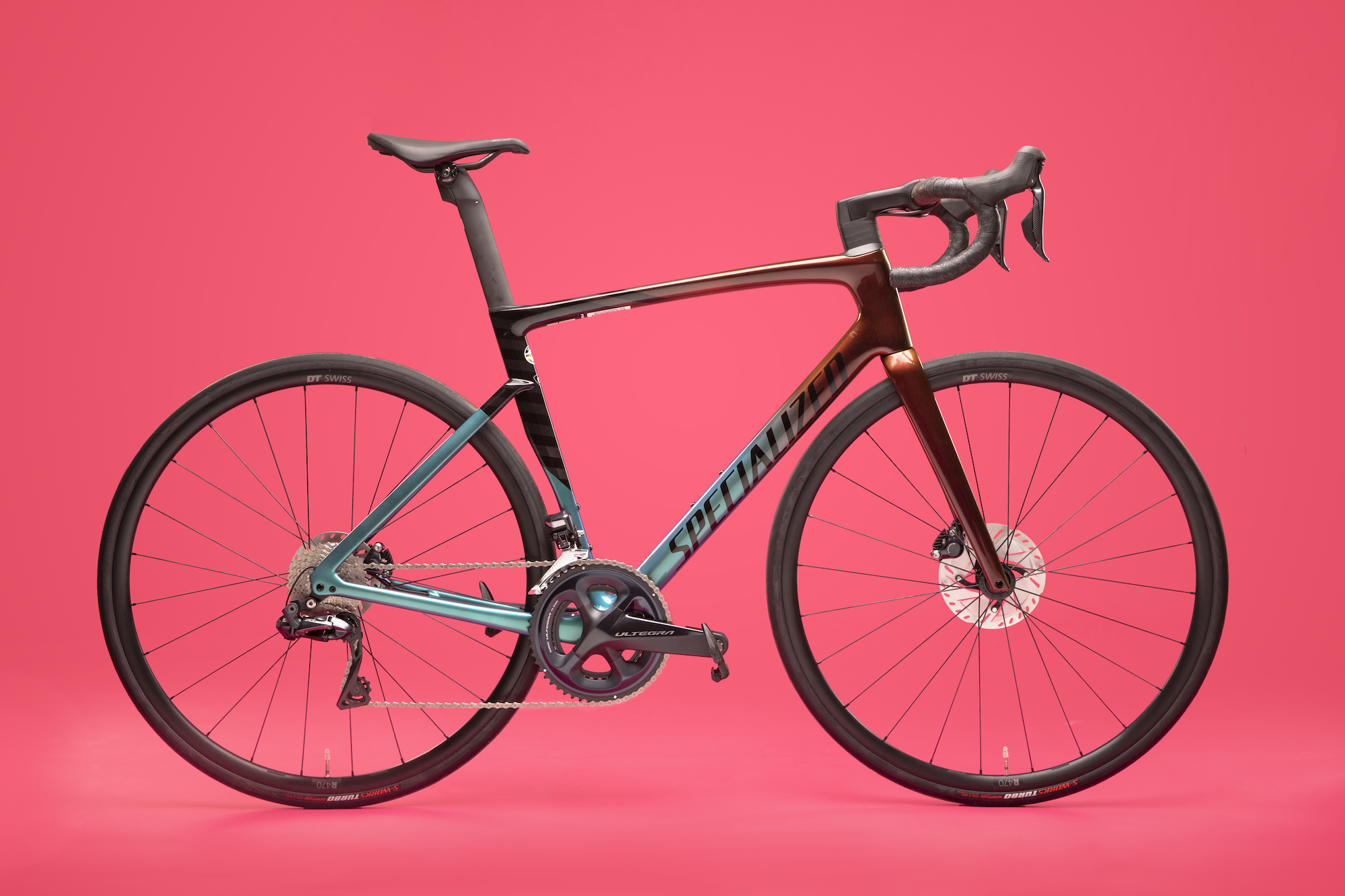
The Tarmac SL7 is a great frame, even when made from lower-grade carbon and specced with Ultegra rather than Dura-Ace, but the budget aluminium wheels could be a cut too far for customers paying £5,250 for this bike.
-
+
Ride quality
-
+
Handling
-
+
Threaded BB
-
+
Cockpit integration
-
-
Budget wheels
You can trust Cycling Weekly.
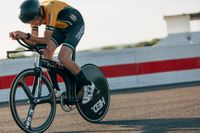
We tested the Specialized Tarmac SL7 Expert as part of a four bike shoot out which also included the BMC Teammachine SLR TWO, Scott Addict 15 and Giant TCR Advanced Pro 0. Each bike was tested with its stock tyre, and a control tyre (Schwalbe Pro One TLE, 25mm), using the same test loop which covered 32 miles and included ascents and descents of Leith Hill and Box Hill in Surrey.
The full set of reviews and final conclusions will be published in Cycling Weekly magazine, out on Thursday April 29.
The Tarmac SL7 is the result of the lightweight Tarmac and the aero Venge growing ever closer. Most brands have started to incorporate elements of aero into the lightweight bikes while shaving weight off the aero bikes but Spesh went the whole hog and merged the two.
In 2021 the Tarmac SL7 is the team bike of Deceuninck-Quick Step, Bora-Hansgrohe and SD Worx and so has a big presence in the WorldTour. However, that bike – the flagship S-Works Dura-Ace Di2 version which costs a frankly insane £11,500 – is different from this slightly more reasonably priced Specialized-branded one that we tested against its counterpart ‘consumer’ versions of the BMC Teammachine, the Scott Addict and the Giant TCR Advanced. The Expert is in fact the entry-level Tarmac SL7, ludicrous as that might sound.
As with those three bikes, a lower-grade carbon is used for the frame. The Tarmac SL7 Expert is made from 10r carbon compared to the 12r carbon of the S-Works Tarmac SL7, meaning it carries a little extra weight for an equivalent level of stiffness (claimed 920g for this frame compared to 800g for the S-Works).
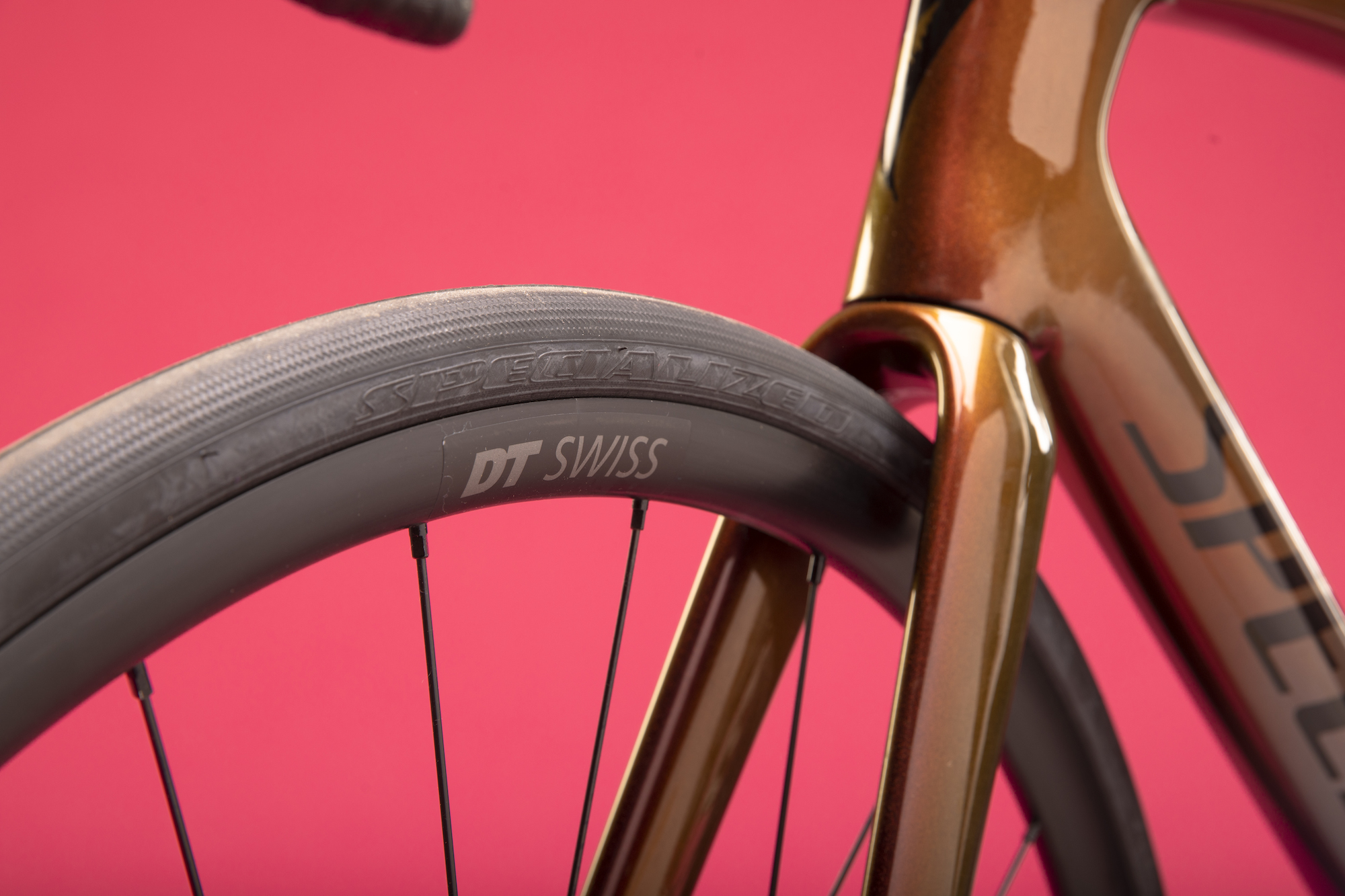
Added to that are the extra grams of the Ultegra Di2 groupset compared to Dura-Ace Di2, more aluminium than carbon featuring in the finishing kit and perhaps the biggest contributor of all to the higher weight - the budget aluminium DT Swiss wheels that come with this model.
It’s worth noting that there’s another Tarmac SL7 Expert at this price that comes with mechanical Ultegra and lighter, faster carbon Roval C 38 wheels.
The latest race content, interviews, features, reviews and expert buying guides, direct to your inbox!
Specialized Tarmac SL7 Tarmac: frame and fork
Although it’s made from the second-tier carbon, the Tarmac SL7 Expert’s tube shapes are the same as the S-Works version’s, which means, according to Specialized, it’s 45 seconds faster over 40km than the SL6 at 50kph (measured in Specialized’s "Win Tunnel").
It’s slightly slower than the old Venge, and although the two look very similar at a glance, the Tarmac’s down tube is not as deep as the Venge’s, the fork is slightly different too, and generally the tubing is a little skinnier. Specialized says it “took a page out of the Venge development book and utilized our FreeFoil Shape Library.”
Like the BMC and Scott in our test, the Tarmac is now a disc-only frame. Whether you approve or not, this gives it very clean lines.
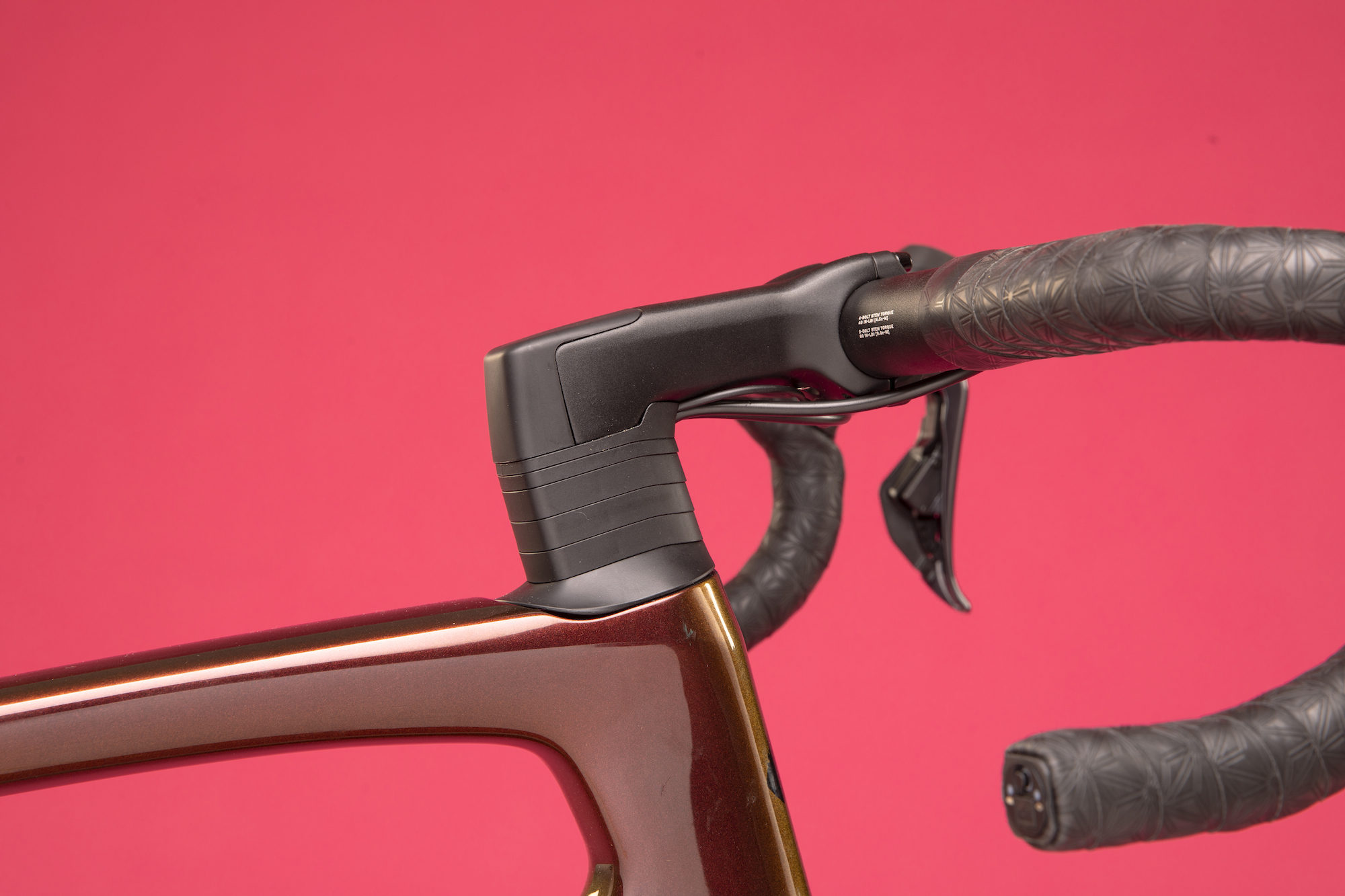
The cable integration is derived from the S-Works version. Hydraulic hoses and Di2 wires disappear into the front of the head tube. The junction box is mounted in the rear of the seatpost - although our mechanic did her own modification and fitted it into the more conventional place in the bar end where it can be seen while riding.
The integration at the front end will save a few watts with its hidden cabling but it won’t be as straightforward to set up. Unlike the Scott’s, the proprietary spacers aren’t split, meaning you’ve got to disconnect hoses and wires if you want to chop the steerer and lower the front end, and it’s not possible to put them above the stem either.
Interestingly, Specialized has returned to a threaded 68mm bottom bracket shell. This seems like a slightly regressive step since by no means all press-fit bottom brackets creak and they do seem like a better engineering solution for a carbon frame, but that's what the people demand.
Specialized has settled on a geometry derived from earlier Tarmacs that works well: the stack/reach ratio of the size 56 is 1.39, which is on the aggressive side compared to the other bikes in our test (the average is around 1.44) but Spesh has inexplicably specced a stubby 100mm stem, which spoils the long-and-low thing.
Components
The spec is centred around Shimano Ultegra Di2 with 52/36 and 11-30. We’ve praised this excellent groupset a lot in the past - the new version due later this year certainly has big shoes to fill.
The bar and stem are Specialized in-house components. They’re separates but the stem is proprietary. As I mentioned, the 100mm is too short for a 56 bike and would need to be swapped for a longer one for most people riding a race bike this size, I would imagine. The 42cm aluminium compact bar is very standard with no internal cable routing. Cables emerge from the under the bar tape (very comfortable, grippy Supacaz Super Sticky Kush) and route underneath the stem into the head tube cover.
There’s lots of clever stuff that when all added up means the Specialized Tarmac Expert SL7 is only a relatively small step down in performance and weight when you consider it costs half as much as the S-Works, but maybe the most obvious downgrade is the wheels.
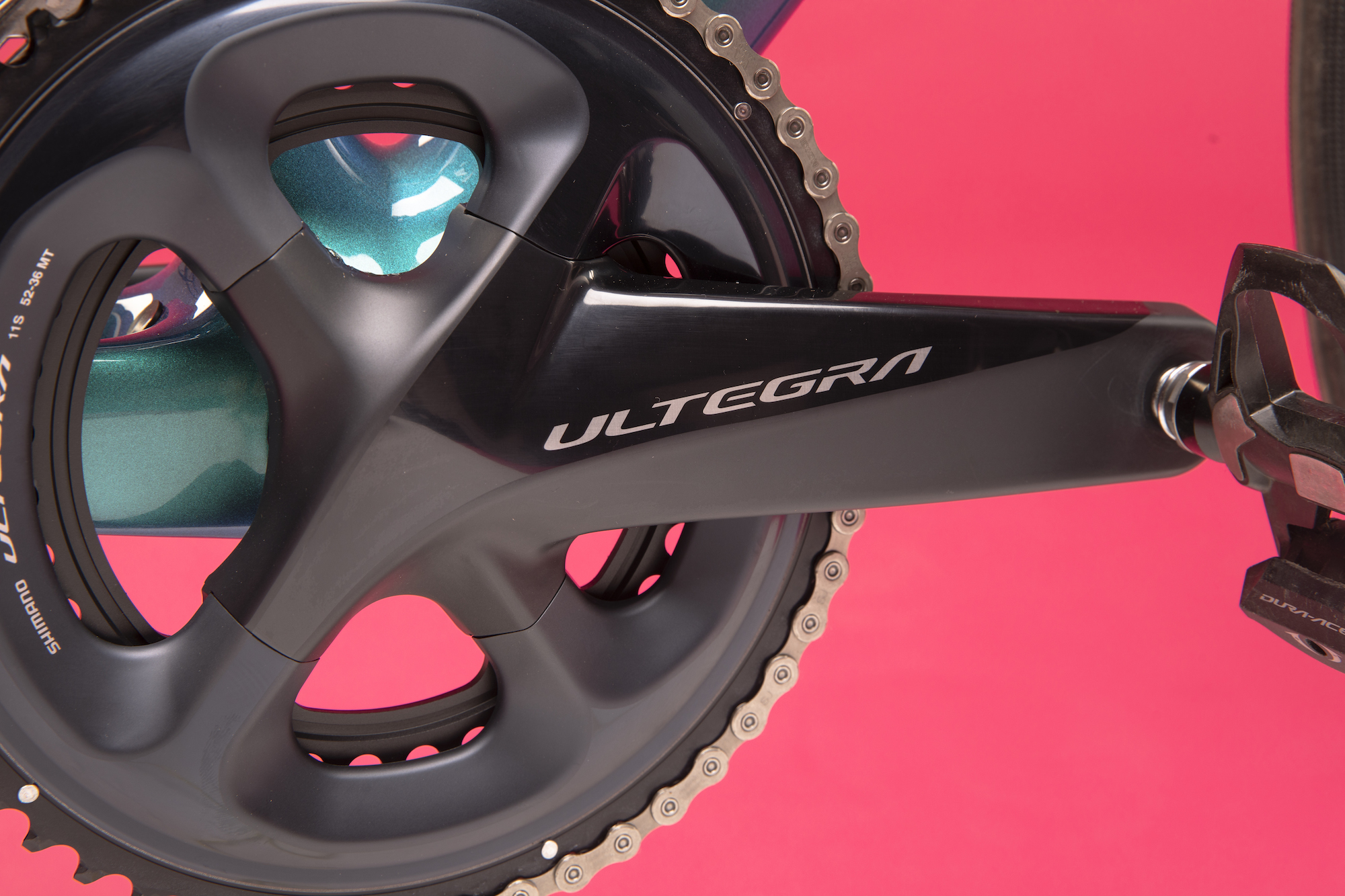
Whereas Giant and Scott have been able to bring in their second-rung race bikes at around £5K with Ultegra Di2 and good carbon wheels, Spesh hasn’t managed it. The DT Swiss R 470 aluminium rims on Specialized’s own non-series hubs are entry level at best. These rims can be bought at Wiggle for £39.99 each. The wheelset weighs 1,790g and seems out of place on a £5K bike. The Tarmac at 7.81kg was the second heaviest bike in our grouptest; with a 1,500g set of wheels it would have been the second lightest behind the Giant (7.37kg)
Specialized’s S-Works Turbo tyres (26mm) thankfully are very nice and save the day on the rubber front.
And Specialized's Power saddle is easy to get on with too – it's popular with a lot of riders for good reason.
Ride
The general consensus seems to be that the SL7 is firmer than the SL6, and that doesn't seem all that surprising given that the tubing is more aerodynamic and the seatpost much more bladed. But I found it perfectly plush, even with the budget aluminium wheels it comes with. I did also ride it with the much lighter, far superior Parcours Ronde wheels (review of those to come), which improved the ride quality further and cut a big chunk of weight off it, making it climb and accelerate even better – as you'd expect.
It's a testament to the Specialized Tarmac SL7 Expert frame that it can still ride so well with cheap wheels. Other frames, such as the BMC Teammachine SLR TWO are apparently too finely tuned to be able to roll with the punches inflicted on their ride quality by budget components, but the Spesh's ride quality shines through.
The stubby 100mm stem could have also compromised the ride experience but even with a slightly shorter position I still relished every pedal stroke. The Specialized Tarmac SL7 Expert felt beautifully balanced for both climbing and descending. On the Surrey Hills loop I used to test all four bikes it was fastest up the longest, most sustained uphill section and was a second slower than the TCR on the fast descent off Leith Hill and joint fastest with the Scott on the entire Coldharbour Lane section, which has punchy little climbs as well as the downhills.
The Tarmac just handles so well – it feels fast, comfortable and lightweight despite the wheels, it's at home on climbs, descents and on the flat and would be perfect for any type of road riding, whether racing, chaingangs, club runs or just riding fast for fun.
Value
Those budget wheels are the fly in the chamois cream. Unfortunately, it's impossible to ignore the fact that they are not just budget but very cheap, and most people would expect more for their £5,250. The problem for Spesh is that other brands offering similarly priced consumer versions of their race bikes – Giant and Scott are the ones specific to our grouptest – have managed to spec good carbon wheels with RRPs of £1,000-plus.
Yes, the Specialized Tarmac SL7 Expert has a great frame with a lovely ride quality and (in my opinion) looks really stunning with this paintjob, but unless you really have to have a Tarmac SL7 those other brands offer a better performance to price ratio with their superior wheels.
Simon Smythe is a hugely experienced cycling tech writer, who has been writing for Cycling Weekly since 2003. Until recently he was our senior tech writer. In his cycling career Simon has mostly focused on time trialling with a national medal, a few open wins and his club's 30-mile record in his palmares. These days he spends most of his time testing road bikes, or on a tandem doing the school run with his younger son.
